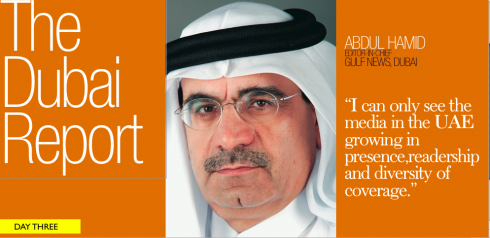
![]()
Mario: You have been a journalist and an editor in the UAE for a very long time: what are the most major changes you have seen in how journalism is practiced here?
>
Abdul Hamid Ahmad: The past 30 years have seen a rapid change in the country . We have progressed from a few daily newspapers and magazines to over a dozen dailies and hundreds of magazines and periodicals. Newspapers have grown into publishing houses, paving the way for faster growth and diverse coverage. Media zones have been established. These developments, in turn, have attracted global media giants be it in print, television or radio, along with highly skilled professionals, equipment/machinery and technology. I do not envision ebb in this tide of progress in the future, especially as the population grows. I can only see the media in the UAE growing in presence, readership and diversity of coverage.
Mario: From working with you for almost 8 years, I know how you emphasize quality, ethics and professionalism for all the journalists with whom you work at the Gulf News. With about ten dailies publishing in English and Arabic here, what is the state of journalistic quality as you see it? Do you see improvements? Can you comment on the newcomers?
Abdul Hamid Ahmad: I have seen the improvements year upon year, especially as new and innovative technology was introduced, which has translated into better-finished and well-designed media products. Newspapers have become more design-led, which was not the case earlier. However, I don ’ t see much progress in the matter of professional journalism, ethics of journalism and freedom of the press. These three aspects need to be addressed quickly, as the advancement on them is slow.
As for the newcomers, well, they bring with them different experiences and expertise from all over the world. However, those skills need to be tailored to fit in the environment of this region where we have traditions, cultures, sensitivities and lack, of course, freedom of the press.
Mario: Finally, your city, Dubai, reaches for the sky figuratively and literally—-unprecedented growth and more coming: what role will the media play in this effervescent environment in the city of the future?
Abdul Hamid Ahmad: It is a known fact that the media has been playing a major role in the development of the UAE. It has functioned as a tool of record of history, as well as a tool of awareness. We have witnessed this, especially over the past three years. Now, as the nation stands at the cusp of greatness, the media should step up and play the role of critic and objective observer. To do that, there has to be more openness, transparency and press freedom. And we thank the Almighty, that the government is aware of this need of the hour and is working to help the media in the country achieve it.
![]()
Why Print is Eternal: Now this is a most provocative and seducing title for a conference these days when everyone seems to be designing some type of tablet or other digital device.
But this one is for real, and anyone interested in hearing a keynote address by William Powers, media critic for the National Journal and author of ³Hamlet¹s Blackberry²: Why Paper is Eternal,” can attend the 11th Readership Conference and Expo, sponsored by WAN (World Association of Newspapers) to be held in Amsterdam, The Netherlands, October 16-17.
I am honored to be in the program myself, and hope to be able to hear this smartly-titled keynote address.
![]()
For more information:
WAN World Digital Publishing Conference and Expo, can be found at
http://www.wan-press.org
Also of interest:
Mr. Powers also wrote: ³Hamlet¹s Blackberry² for the Joan Shorenstein Center on Press, Politics and Public Policy at Harvard University. It can be downloaded at
http://www.hks.harvard.edu/presspol/research_publications/papers/discussion_papers/D39.pdf
Inquiries to: Larry Kilman, Director of Communications, WAN, 7 rue Geoffroy St Hilaire, 75005 Paris France. Tel: +33 1 47 42 85 00. Fax: +33 1 47 42 49 48. Mobile: +33 6 10 28 97 36. E-mail: lkilman@wan.asso.fr